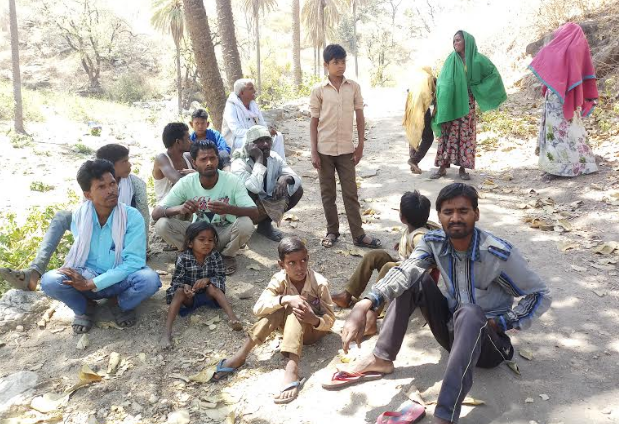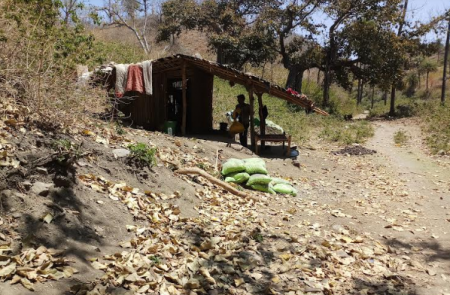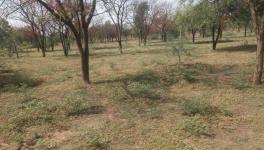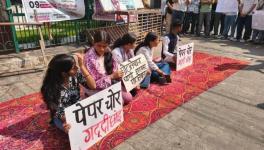Tribals in Rajasthan’s Banswara Forced to Mortgage Children

New Delhi: Rising inequality has severely affected the tribals in parts of Rajasthan where poverty-stricken family elders use their children as pawns for a living. While corporate-backed media corporations find “divine solace” in tom-tomming India’s growth story, they overlook the pain with which the marginalised communities live, or say die, on a daily basis.
The trial and tribulations of the tribal families do not set any “political narrative”, which could invite debates on TV or be a poll plank. The state officials and the Centre have laid out plans for their overall growth on paper, but the areas have lost the compass.
Amba – a resident of Mamkhor village at Dungariya panchayat in Ghatol tehsil of Banswara district – had to mortgage her 12-year-old Sunil for six months to a Gadaria (a peasant-pastoral community mainly into shepherd rearing) for just Rs 1,500.
Amba’s husband Rajmal Buj – who was a truck driver – died eight years ago. Except for the 48-year-old, there is no one in her family of five to earn their livelihood. She owns a small piece of land where she grows maize and wheat when it rains. Because of the insufficient rains this year, the crop failed and she does not have ration at home.
Left with no option, she recently borrowed Rs 1,500 from the man and sent her minor and only son as a pawn. “I don’t have any source of income. There is no monetary earning from agriculture. It has become extremely difficult for me to feed my four children (three daughters and one son). The Gadaria gave me Rs 1,500 and asked me to give my son – who will help him in grazing. I was assured that he would get a certain sum every month as wage,” she told NewsClick.
“But as a Hindi daily published this news, I was arrested by the police,” she said, adding that she was released on bail on June 20 evening and her son was also rescued.
Asked if she gets work under NREGA (National Rural Employment Guarantee Act, 2005) and ration under the PDS (Public Distribution System), she said she has never got any work under the 100-day job guarantee scheme. “We only get 5 kg of rice every month from local ration dealer,” she added.
At a critical juncture when the country is undergoing severe agrarian distress, the central government is accused of “deliberately undermining the only legal guarantee of employment for the most marginalised, particularly in times of acute rural distress”.
Fifty-nine kilometre from the district headquarter lies Churee village, which is drought-hit and does not have electricity. Twelve-year-old Ajju lives in a thatched house in the hilly village along with his parents and four sisters. The family is poverty-stricken depends on two bigha of land for livelihood. The family has to depend on rain water for agriculture as there is no other option for irrigation. There is no crop this year because of no rains.
Ajju’s father Mohan is an alcoholic. His mother Indra was reportedly at her parents’ place when Mohan went to an agent (who is allegedly involved in human trafficking) and mortgaged Ajju for Rs 2,000 every month.
Another resident of the same village, Mohan, 12, who had been working with a Gadaria for the past two years, recently managed to escape and reach home. His father had given him to the Gadaria for Rs 2,000 with his mother’s consent as there was nothing at home to eat. They thought that the sum they would get will make ends meet for a few days.
Scores of parents in these remote villages of the desert state have sent their underage children to Gadaria and other money lenders as pawns.

The Gadaria generally come from Marwar region (Jodhpur, Jaisalmer, Sirohi and Pali districts) to Banswara where they get child labourers at lower costs. They come to Banswara and Pratapgadh in groups each of which have a herd of 1,000-1,500 sheep and goats. They – according to locals – have their local agents who target backward villages, which lack even basic facilities and where residents are poor and illiterate.
The agents convince underprivileged families and send their children for small sums ranging from Rs 1,000-Rs 5,000. Once these children – who generally belong to the age group of 8-14 years – go with Gadaria, their return becomes extremely difficult, as this animal rearing community does not have a permanent place and keeps moving like nomads. Children in this age group are targeted because they eat less, work hard and can easily be terrified.
NewsClick spoke to one such agent in Pratapgarh who initially denied his involvement in this crime, but later revealed that when parents approach him for some employment of their children, then he contacts Gadaria who are in touch with him. “Once the deal is finalised with parents through me, I make the payment and send the children to the person in need,” he admitted, refusing to divulge more.
The district administration, its anti-child trafficking units, Child Line and Children Welfare Committee can take suo moto cognize to curb this crime, but the locals allege, they come out of slumber only after the issue is reported in the media.
Narayan Maida, a local activist, said this is an age-old tradition. “Because of extreme poverty, people mortgage their children to Gadaria and local money lenders. Once they return the borrowed sum, they are supposed to get back their children. But this does not generally happen. The minors are forced to work as bounded labourers,” he said alleging that the administration is “well aware of it but does not intervene”.
“We sometime raise voice, but unfortunately do not get support from the parents. They argue who will feed them if they do not send their children to work. It is an example of sheer neglect of the state government, which has measurably failed to provide employment and other basic facilities to these marginalised people,” he added.
Another activist from Kotamangri village in Ghotal tehsil said it is happening because of ineffectiveness of Gram Sabhas (village councils), which are constituted by the government in violation of the provisions of PESA – Panchayats (Extension to Scheduled Areas) Act, 1996 – law. “Had there been proper implementation of PESA and formation of strong Gram Sabhas, the situation would not have been the same,” he added.
Get the latest reports & analysis with people's perspective on Protests, movements & deep analytical videos, discussions of the current affairs in your Telegram app. Subscribe to NewsClick's Telegram channel & get Real-Time updates on stories, as they get published on our website.
























